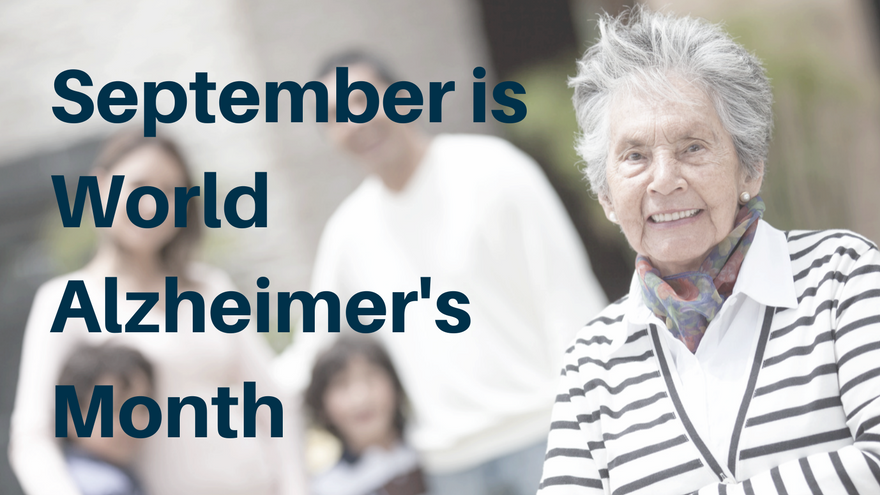
September Is World Alzheimer's Month
By Jillian Mellum, Social Media & Administrative Manager, Senescence Life Sciences
Maybe you’ve heard some of the statistics before – that nearly 50 million people in the world currently live with dementia, with a new case developing every 3 seconds. Or that by 2018 the global cost of dementia will have surpassed 1 trillion USD and by 2050 it’s expected that 131.5 million people will be living with the disease.
September is World Alzheimer’s Month (WAM), a month dedicated to raising awareness and reducing the stigma associated with dementia. WAM was launched in 2012 by Alzheimer’s Disease International (ADI), an international federation of Alzheimer’s associations from around the world with a vision for prevention, care and inclusion today, and cure tomorrow.
Dementia is a challenge not only for those living with it but also for their families and caregivers, which is why WAM aims to promote awareness and show the impact of the disease, and determine what can be done to help and support those affected.
“2 out of every 3 people globally believe there is little or no understanding of dementia in their countries”
Dementia is an umbrella term for diseases that cause a progressive deterioration of many different brain functions, including memory, recognition, thinking, planning and speech, with Alzheimer’s disease accounting for nearly 50 to 60% of all cases. 1 in 20 people over the age of sixty-five will develop dementia, with the odds increasing to 1 in 5 for people over the age of eighty.
This year’s theme for WAM is “Remember Me: Early diagnosis means I can live well for longer.” Early diagnosis means those afflicted with dementia and their care givers can live healthier, happier and longer lives. It helps to reduce the stigma surrounding dementia and raise more awareness not only for those directly affected by it but those who may be worried about getting it and those who care for people who have it. It is also an opportunity to inform governments and policy-makers on the impact of dementia and the threat to global health it carries.

Dementia is not a normal part of aging
Did you know that people who take better care of themselves in their 20s are more likely to develop healthier brains that are better able to defend themselves against the progression of brain aging later in life?
According to a recent Northwestern Medicine study published on July 19th of this year in Neurology, individuals who took better care of their cardiovascular health in their 20s went on to develop brains with larger volume and less abnormal tissue in their 40s.
Cardiovascular health was defined by the American Heart Association’s “Life Simple 7” guidelines. These encourage people to maintain good heart health by focusing on seven key items:
- Healthy Blood Pressure
- Healthy Cholesterol Levels
- Healthy Blood Sugar Levels
- Regular Exercise
- Healthy Diet
- Weight Loss
- Reducing or Quitting Smoking
Researchers measured the relationship between cardiovascular health and brain health by assigning a point value based on how closely a person was adhering to the heart healthy guidelines. What they found was that those who more closely observed the guidelines experienced the least amount of brain aging.
In fact, the difference in age between the brain of someone who had most closely followed the guidelines compared to someone who had not followed them at all was a staggering 10 years! This shows the significant positive impact you can have on your brain health by taking proactive steps early in life.
Looking after your heart is also one of the 5 steps recommended by ADI to reduce the risk of developing dementia, along with diet, exercise and continually challenging your brain. You may have noticed that diet and exercise are recommended by both the American Heart Association and Alzheimer’s Disease International and there’s a good reason for that! Both have shown significant benefits in maintaining a healthy brain and helping to prevent diseases such as Alzheimer’s.
Alzheimer’s disease isn’t just a concern of the elderly
Hilarity for Charity and the Women’s Brain Health Initiative are examples of non-profit organizations that have focused their efforts on millennials in the fight against dementia. Hilarity for Charity was founded in 2012 by actor Seth Rogan and his actress wife Lauren Miller Rogen in order to raise awareness of Alzheimer’s disease among the millennial generation. By engaging millennials they hope progress can be accelerated in Alzheimer’s care, research and support.
The Women’s Brain Health Initiative has created a membership program called Millennial Minds for those under 40 that are interested in protecting their brain health with the intent of staying cognitively healthy throughout their lives. Without a cure for Alzheimer’s, making preventative lifestyle changes could benefit future generations in the fight against dementia.
This September, as part of World Alzheimer’s Month make raising awareness and prevention of Alzheimer’s and dementia a priority - not only for yourself but for those around you. Take part in the Senescence Life Sciences 30 Day Better Brain Challenge this September and start living a brain healthy lifestyle while encouraging others to do the same. The positive lifestyle changes we make now will have a far reaching and lasting impact on our future for generations to come.
Sources:
Statistics, Images and World Alzheimer’s Month content courtesy of Alzheimer’s Disease International.
Bancks, M. P., et al. Cardiovascular health in young adulthood and structural brain MRI in midlife. Neurology. Aug 15, 2017 vol. 89 no. 7 680-686. Epub 2017 Jul 19.
Subscribe to our RSS Feed.